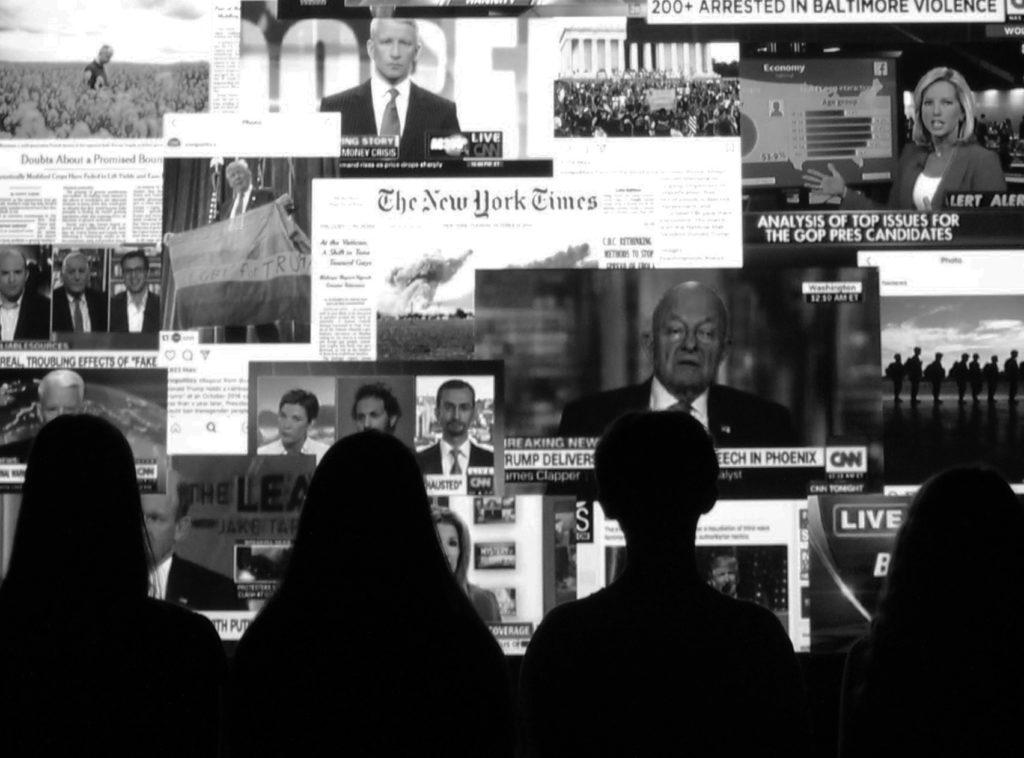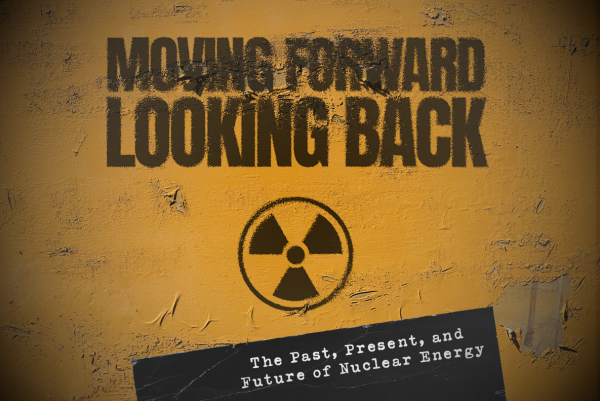OUT OF SIGHT, OUT OF MIND- Teens struggle to see the importance of international conflict through the lens of modern media.
In the blink of an eye, the Atari and newspapers of our parents’ childhood transformed into the internet and 24-hour news we know today. With a swipe and a tap, information they had to sift through libraries for is at our fingertips: no post or show is off limits. We find ourselves in a new age of innovation, one defined by instant access and constant streaming of news and events. Everything just a Google search away means we are constantly in the loop, whether we seek news or not.
Over the past decade, social media has become an integral part of American culture. According to a 2015 Pew Research Study, 94 percent of teens go online everyday, which means the information on these outlets play an enormous role in the mindset of American youth. But with so many platforms reporting thousands of different stories per day, how do we figure out which are the most important?
The unfortunate answer is that we usually don’t. According to Jason Gainous, political science professor at the University of Louisville, the media is profit-motivated and “is simply responding to public demand” rather than what’s most newsworthy. Gainous is referring to populist journalism, which prioritizes what the audience wants over what is most important. While not all modern journalism is populist, Gainous claims this form of reporting is dominating the media. He says if a story resonates with the audience, “the media will keep playing it because they get attention, ratings, and ultimately sales.”
Take clickbait for example: millions of us read stories about celebrities every day; however when it comes to complex explanations of foreign affairs, we won’t give it the time of day. In fact, according to a 2017 survey by Global Shapers, a network dedicated to inspiring young people under the age of 30 to work together to address local, regional and global challenges, only 4.6 percent of American millennials ( born between 1981- 1997 ) deemed “large scale conflict/wars” to be the most important issue in the world today.
In our defense, staying informed on issues as complicated as foreign affairs and international conflict is difficult in the era of social media and televised news. According to Dr. Jason Abbott, a political science professor at the University of Louisville, modern media is appealing to us because it’s quick and easy, but it’s “simply not setup to explain the intricacy of foreign conflict.” In other words, we gravitate toward quick answers to complex problems — a luxury simply not available for international conflict like the war in Afghanistan. Afghanistan is not a problem that can be explained in a two minute read or within the 280 character limit of a Twitter post, making it difficult for social media platforms to adequately keep us up-to-date. So its no surprise that we lack an in-depth understanding of the war.
If you are not an international affairs fanatic, the intricacies of the war in Afghanistan can be downright confusing. Heck, even some adults are confused, and they’re the ones voting for politicians who have a say in the issue. Nonetheless, it’s never too late to be informed.
For the majority of the 21st century, the U.S. has had troops stationed in Afghanistan and eventually Iraq to engage in what former President George W. Bush’s administration referred to as the “War on Terror.” In short, the war in Afghanistan was prompted by the 9/11 terrorist attacks which led the U.S. to invade Afghanistan, remove the Taliban, and chase Osama bin Laden into hiding near the border of Afghanistan and Pakistan. After years of investigation by American intelligence, American troops found and killed bin Laden in Pakistan on May 2, 2011. Even without this threat, the U.S. has maintained military presence in Afghanistan ever since our initial invasion in 2001.

Of course, the conflict in Afghanistan is not the only complicated war on America’s timeline — think about how long it takes to explain the world wars in history class. However, the nature of war has shifted since the 20th century, and frankly this new style has not sparked our interest.
An indifference to war is unique to our generation and contradictory to the traditional American mindset. Past wars were always hot topics in the news and American society whether they presented victory, loss, pride, or polarization. When Americans shipped their loved ones off to fight in World War II, they were bound to be connected to the conflict. While the deaths were tragic, the country was unified in fighting against a common enemy. By contrast, during the Vietnam War, the struggle for peace divided us and tore the country apart. People chanted, “Make Love, Not War,” and even Martin Luther King Jr. spoke to crowds, calling for peace. Whether citizens wanted boots on the ground or signs in the sky, their impassioned responses reflected the reality of a war that everyone could find a stake in.
Decades later, the war in Afghanistan evokes a different reaction from the public. We have lost a connection to war that was evident in the past. And public sentiment isn’t the only thing changing; Scott Gardiner, Iraq and Afghanistan veteran and current Co-Chair for the Veterans Community Alliance of Louisville, has noticed a shift in military procedure as well. He stated that the war in Afghanistan is “more strategic in nature and conducted by a much smaller military against a specific enemy,” compared to Vietnam and the world wars.
The amount of manpower that was required for the 20th century warfare is simply not needed in Afghanistan. For nearly two generations, no American has been drafted for service, and therefore, according to Gardiner, “[Few] Americans have ever served, have a family member that has served, or even know anyone that has served.” As a result, we millennials and teens of Generation Z (born 1995-2010) lack a personal connection to the armed forces and, consequently, insight about what war entails, who has served, and what they have experienced.
This disconnect makes sense, considering are less likely to know a soldier and, therefore, less likely to grieve the death of one. The most recent numbers from the Department of Veteran Affairs show that in the four years of World War II, 291,557 soldiers died compared to the 6,915 lost thus far in The War on Terror. Of course, the number of fallen soldiers does not diminish the significance of what is going on in the Middle East and should not deter us from recognizing the bravery of modern soldiers. However, Gainous claims that our interest in conflict is in part driven by how many American lives are being lost, stating, “Our count is not what it was in World War I, World War II, or Vietnam.”
Granted, the War in Afghanistan does not directly threaten the safety of life on American soil, but that doesn’t mean the conflict across the ocean isn’t costing us trillions of dollars and thousands of American and foreign lives. The war in Afghanistan has killed thousands of innocent Afghani citizens, destroyed their country’s infrastructure, and set them up for years of political instability. Despite the costs, we as Americans have lost interest: the war in Afghanistan has simply become old news.
It has been nearly two decades since the war in Afghanistan began, and, according to Abbott, there is no indication that we are even close to a solution. In fact, the most recent news regarding the war discussed plans that would likely fuel more battle, not stop it. President Donald Trump has yet to sign a bill, but his administration has specified that there will be about 4,000 more soldiers deployed to Afghanistan as reinforcement to the 8,500 U.S. service members currently in the region. His decision to boost troop numbers is a response to a concern with the rising power of the Taliban in the region.
On the surface it seems that deploying more soldiers will just prolong the war; however, Trump hopes it will lead to peace in the Middle East, saying, “From now on, victory will have a clear definition: attacking our enemies, obliterating ISIS, crushing al-Qaeda, preventing the Taliban from taking over the country, and stopping mass terror attacks against Americans before they emerge.”
We can only hope that Trump’s plan will be the beginning of the end. However, for the American people, the light at the end of the tunnel can be hard to see. According to Gainous, the war has been going on for so long that instead of seeking a solution we have “just normalized the idea of this perpetual war.”
It’s not that war has ceased to be a part of American lives, but as it becomes normalized, we don’t necessarily feel the need to indulge in the details. “We are desensitized to it,” Gainous claims. “War is just happening, and we don’t even really think much about it. That is just what we do. The new world is war, war all the time.”
For many of us, the last time we thought or heard about war was as we watched Christopher Nolan’s World War II movie “Dunkirk” in the comfort of a reclined theater seat or played Call of Duty with our friends. We no longer see war as a part of the present, but instead something faraway, both in terms of physical and historical distance. This sentiment extends beyond the war in Afghanistan and can be found in the way we react to incoming threats, like those from North Korea.
Over the past few years, North Korea’s leader Kim Jong-un has dramatically increased the country’s missile development efforts. North Korea’s impending status as a full nuclear-power state has increasingly endangered world peace and the United States. On December 1 North Korea test launched Hwasong-15, the first intercontinental ballistic missile able to reach any target in the continental United States. This unsettling breakthrough on behalf of North Korea should be a wakeup call for the country. But, if our president doesn’t take it seriously, why should we?
Trump gave past missile tests, such as Hwasong-12 and Hwasong-14, plenty of attention on the media, yet when it came to his tweets he failed to recognize the gravity of the threats. He even took a jab at the North Koreans, tweeting, “Just heard Foreign Minister of North Korea speak at U.N. If he echoes thought of Little Rocket Man [Jong-un], they won’t be around much longer.”
Trump’s snarky remark took an unexpected turn when North Korea’s foreign minister Ri Yong-ho told reporters that the tweet was a declaration of war against his country, and that North Korea “will have every right to make countermeasures.”
By the end of the online exchange, media outlets ranging from The Guardian to Buzzfeed had reported on the story — but not for the reasons you would think. Articles and tweets revolved around Trump’s Twitter drama, and the threats from North Korea were either swept up in the comedy or lost in the mix of serious news. Eventually, its humor burned out, and most of the online world lost interest in the story. We know the idea of a war sparked by a Twitter fight seems impossible, but maybe we shouldn’t be taking North Korea’s threats with a grain of salt — after all, they do have weapons of mass destruction. We have never overlooked the threat of nuclear bombs in the past, so why are we starting now?
Abbott feels that modern youth tend to view nuclear weapons as a relic of the past rather than a threat to the present. He suggests this detachment is why, “[nuclear threats] from North Korea do not weigh on younger people’s shoulders the way they would have on teens of past generations and certainly my parent’s generation who lived in a hot period of conflict between the U.S. and Soviet Union [1947-1991].” A threat like this would have startled the entire country at the peak of the war, during when the fear of nuclear attack was ever-present. During the sixties schools took precautionary measures, even implementing bomb drills for student safety. Today, this fear is not palpable; threats don’t grasp our attention, and eventually we forget about them.
At the rate we are going, Americans could become desensitized to all issues that are not constantly piquing our interest. Obviously, articles about increased troops in Afghanistan are not topping today’s entertainment charts, but just because an issue isn’t popular doesn’t mean it’s not important. As Generation Z, we are quickly turning into the voters and lawmakers of modern America. It is time to step outside of our bubble and inform ourselves of the issues that will shape the future of our country. After all, just because some things are out of sight, does not mean they should be out of mind.
Donations are collected through The Publishers, duPont Manual High School's booster club for J&C. On The Record relies completely on sponsorships, advertisements, and donations to produce and distribute each issue. Please consider donating to our cause, and helping the student journalists of OTR amplify youth voices for years to come.














Jediah Holman • Feb 13, 2019 at 11:59 am
THIS STORY IS AWESOME #YEAHHHHH